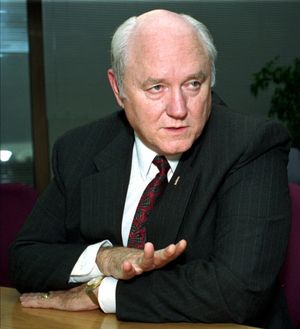RIP: Jack Ward Thomas left legacy in forest, wildlife management
PUBLIC LANDS -- Jack Ward Thomas, 81, passed away Thursday, May 26, at his home in Florence, Montana, of natural causes, bringing many hunters and conservationists to remember his leadership as a wildlife ecologist and 13th chief of the U.S. Forest Service.
The Rocky Mountain Elk Foundation was probably aware of his declining health last year when the group bestowed JWT with its highest honor.
One of my favorite JWT observations came in 2001, five years after he'd left his Forest Service post. He was urging conservation peace and progress after environmental groups had turned the tide on overcutting on the national forests.
“Fierce in battle, many of the eco-warriors have been unable to come to grips with the consequences of victory and are now reduced to wandering about the old battlefields ‘bayoneting the wounded.’ Their counterparts from the resource extraction community, likewise, cannot come to terms with defeat and hold ‘ghost dances’ to bring back the good old days when they were the undisputed Kings of the West.”
The talk about disposing of federal public lands isn't new. JWT left no doubts about his position in a speech before the Outdoor Writers Association of America in 1995:
Rising to a defiant crescendo, Thomas declared, "Speaking for myself, I won't stand for [making public lands private] for me and I won't stand for it for my grandchildren and I won't stand for it for their children yet unborn. This heritage is too precious and so unique in the world to be traded away for potage. These lands are our lands -- all the lands that most of us will ever own. These lands are ours today and our children's in years to come. Such a birthright stands alone in all the earth. Hell no!"
Before dealing with the politics of managing public lands and wildlife, he was a leader in wildlife research including the elk and mule deer research in the Starkey Project in Oregon. Among other things, the project produced important science on the detrimental impact motorized vehicle use has on big game.
Forest Service Chief Tom Tidwell reflected today on JWT's passing.
I want to take a moment to reflect on the recent passing of a former leader of the Forest Service team, Jack Ward Thomas. Jack passed May 26 after battling cancer the last few years. Jack took on his last challenge just like he did everything: using science, being optimistic, and accepting reality, and being straightforward. I will miss Jack, not only for his dedication to science and his conservation leadership, but also for his stories. Even when he and I were in a lively debate, Jack would have me laughing before we were done. In addition to his many individual accomplishments and recognitions, Jack will be remembered as a dedicated scientist for -- through his work-- science was elevated and took its’ rightful place, providing solutions to conservation challenges.
Jack was Forest Service Chief from 1993 to 1996. During his tenure and throughout the rest of his life, he provided invaluable contributions to forestry and conservation issues, leaving a lasting legacy of achievements. He was the epitome of leadership in “Caring for the land, and serving people” when he was with us.
Jack began his Forest Service career in 1966, in Morgantown, West Virginia as a research wildlife biologist. In the years that followed, he developed an amazing career as an agency scientist. He served in a variety of locations, culminating in his selection to lead the Forest Service.
During his tenure, Jack faced numerous challenges, including heavy conflict between the timber industry and the environmental community, particularly in the Pacific Northwest, and a controversial presidential forest plan for the spotted owl regions of the Pacific Northwest and northern California. Yet through it all, he managed to not only face those challenges, but also to develop a pioneering ecosystem management approach on the national forests and grasslands.
Throughout his life, Jack was a prolific writer, publishing over 250 books, chapters, and articles, primarily on elk, deer, and turkey biology, wildlife disease, wildlife habitat, songbird ecology, northern spotted owl management, and land use planning. He received multiple awards for his work including USDA Distinguished Service and Superior Service Awards; Elected Fellow, Society of American Foresters; National Wildlife Federation, Conservation Achievement Award for Science; The Aldo Leopold Medal, The Wildlife Society; General Chuck Yeager Award, National Fish and Wildlife Foundation; and USDA FS Chief's Award for Excellence in Technology Transfer. In addition, he served as president of The Wildlife Society from 1976 to 1977.
In short, Jack was an integral part of Forest Service and other forestry history. Not only did he shape our forest management philosophy, but he was also a mentor and friend to me and many of today’s environmental conservation leaders, both inside and outside the U.S. Forest Service. He will be greatly missed.

